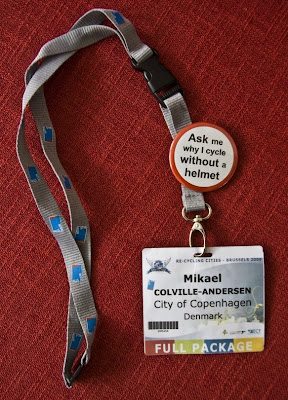
 In a perfect world, an individual who chooses to promote everyday cycling, and who has dedicated a great deal of time, energy and personal resources to do so, would be set high atop a pedestral to be respected by the local and global community.
In a perfect world, an individual who chooses to promote everyday cycling, and who has dedicated a great deal of time, energy and personal resources to do so, would be set high atop a pedestral to be respected by the local and global community.
Instead, Matthew Modine, actor and founder of Bicycle for a Day, is subject to a cyber witchhunt these days.
Instead of focusing on the good this guy is doing, all the focus is on his personal choice of whether he wishes to wear a helmet or not. Which he doesn't.Ironically, the man is more well-informed about helmets than the pundits who seek to hunt him down.It started in an interview by Tim Murphy in New York Magazine, which was picked up by Ecorazzi and then Treehugger.
The witchhunt was off to a cracking start in NY Mag with the title: 154 Minutes With Matthew Modine - The actor and activist wants to make the world a greener place. But why won’t he wear the helmet his wife bought him?
Already right there we're not talking about making the world a greener place or Bicycle For A Day. The focus is far from these good things. Instead, we focus on the bad. The journalist is interested in the man's private business.
Michael Andre d'Estries at Ecorazzi picks up the pitchfork, salivating as he sharpens the points, when he writes "There’s an interesting quirk, however, to Modine’s love of biking — he doesn’t wear a helmet... the 50-year-old says he doesn’t wear one, because he doesn’t assume he’s going to get hurt. Right — because I wear a seatbelt with every intention of getting in an accident." [So it's 'quirky' that 50% of American cyclists don't wear helmets? Hmm.]
Then Lloyd Alter at Treehugger, darling of the helmet industry, gets his knickers into the usual twist. Let's face it, this guy is the Fox News of the bicycle world.
Let's get one thing straight. None of these three men are helmet experts. Lloyd tries to fake it like a porn star but really, these are journalists in Emerging Bicycle Cultures writing about cycling. Let's not take them too seriously. If I want news about the latest cricket Test Match, I don't read Icelandic sports websites.What IS serious is their lack of support for everyday cycling and their eagerness to promote The Culture of Fear instead of promoting a life-extending, safe, healthy form of transport that can also transform cities into more liveable places.
I've visited a number of Emerging Bicycle Cultures through Copenhagenize.com and CopenhagenCycleChic.com and cycled in all of them. When I lecture about Marketing the Bicycle to the Sub-Conscious Environmentalists I have a slide in the powerpoint that sums up how cycling, in many Emerging Bicycle Cultures, is branded:

The difference between North America and other Emerging Bicycle Cultures is remarkable. I covered the rebirth of the bicycle in Paris last year and I was recently speaking in Riga and Moscow. Helmets don't even feature on the radar. Before the start of our Cycle Chic ride in Moscow, one of the organisers apologised that there was an older chap in a helmet and he hurried over to ask him to take it off. In Spain, France, Italy it's the same. When a Polish fashion blogger asked other Polish fashion bloggers to take a photo of themselves with a bicycle in the style of Copenhagen Cycle Chic, there weren't any helmets in the photo montage.
Even in an established bike culture like Japan in general and Tokyo in particular, there are hardly any helmets among everyday cyclists, as you can see right here.
All the people involved thus far in this discussion are homo sapiens who have developed the ability to judge personal risk for themselves. At that level, we're all equal.So why is it so different in North America?The question of lack of helmets has little to do with infrastructure. It is a cultural and, most importantly, economic issue. There are 100 million daily cyclists in the EU accordingly to the European Cyclists Federation. Easily half don’t have dedicated infrastructure and yet they don’t wear helmets.
The reason is quite simple. All the main helmet manufacturers are American. When they started suddenly promoting helmets in the late 1980’s, they targeted their local market and aimed helmets at those who cycled there; namely sports enthusiasts and hobby cyclists. The helmet was yet another piece of ‘necessary gear’ to be sold. The manufacturers capitalized on their branding of cycling as a fast-paced, sweaty sport.Ironically, no helmet manufacturer will tell you that helmets will or can save lives. When I met a marketing man from a European helmet [and other stuff] manufacturer at the Velocity 2009 Bicycle Conference, who wandered around with a helmet dangling from his bag, I asked him straight out: "Can your helmet save your life?" He shrugged and laughed uncomfortably. "Can it?" "Well, not save your life, no." When I asked why he walked around with it he simply replied, "Because I sell them."At least this guy knew what many people do not. That bicycle helmets are merely merely designed to protect the head from non-life threatening injuries in solo accidents under 20 km/h. And preferably if you land flat on the crown of your head, please. They are not even tested for impact on the sides or back.The lack of helmets in countries outside of America and her cultural puppet state, Great Britain [wink wink nudge nudge], is because helmet manufacturers are American. With regards to Australia, it is hardly surprising that a Vice-President from Bell flew all the way to Australia to be present at every hearing in the early 1990's regarding passing the mandatory helmet laws. He sat quietly in the audience and spoke with the proponents of the law in the breaks.What if the main helmet manufacturers were European? Who knows how things would be. One thing is certain, they would certainly be subject to the usual strict standards applied to other goods and services. As it is now, the helmet industry sits at the table when the standards are decided. As a result, the EU standard 1078 is among the weakest in the world.Would I want cigarette manufacturers at the table when deciding about health laws and campaigns? Nope.So North America has had decades of branding cycling as a 'sport' or 'fast-paced recreational activity' and not much else. This mentality has sifted down to individuals, like the three journalists up top, and has so ingrained itself on the population that the helmet is virtually religious folklore. Hardly healthy for a sound debate or for providing citizens with the big picture and the ability to choose for themselves.
In the current debate, nobody seems to give a shit about the 40,000 motorists killed in America each year, not to mention those who are maimed. Nobody seems to think that motorists should wear helmets, even though motoring helmets actually exist. The risk of drowning is much higher than dying while cycling, so where are the lifevest advocates? What about the 87,000 people hospitalised each year in America because of THIS shockingly dangerous activity? Why aren't they sold safety gear? Where's the logic?
It's usually absent when there is money to be made. Surprise, surprise.The helmet scepticism in Europe and elsewhere is due to a more thorough review of the available scientifc research on the subject, instead of emotional propaganda. It can be summed up in the report issued by the European Council of Ministers of Transport [the ministers of transport for each EU nation] called National Policies to Promote Cycling (2004)."Though helmets are widely accepted as reducing the severity of head injuries, the issue of mandatory requirements for helmet use has been controversial for a long time. PROMISING, a research project commissioned by the European Union and coordinated by the SWOV Institute for Road Safety Research (2001), suggests that from the point of view of restrictiveness, even the official promotion of helmets may have negative consequences for bicycle use, and that to prevent helmets having a negative effect on the use of bicycles, the best approach is to leave the promotion of helmet wear to manufacturers and shopkeepers.
The report entitled 'Head Injuries and Helmet Law for Cyclists' by Dorothy L. Robinson, Bicycle Research report No. 81 (March 1997) shows that the main effect of the introduction of the general helmet law for cyclists in Australia was a drop in bicycle use."This is the upper echelon of Europe government speaking here. They're worried about fearmongering and public health. Furthermore, the national cyclist federations in Holland, Germany, Belgium, Great Britain, Ireland, France, among other countries do NOT actively promote helmets and they fight legislation tooth and nail.
Even the European Cyclists' Federation, at the recent Velocity 2009 Bicycle Conference in Brussels, produced these badges in the interest of placing the focus back on the positive promotion of cycling, instead of fear-mongering. And if Matthew Modine is victim of a witchhunt, imagine what would happen to the Dutch Cyclists' Federation's [Fietserbond] traffic consultent, Theo Zeegers, if he were let loose in the North American press. Drawn and quartered by four SUVs, head left on a spear outside the city's gates.The general attitude towards helmets in North America is the result of decades of exaggeration, misinformation, emotional blackmail all backed by the economic interests of the helmet industry. If I was 'over there' I'd feel duped and brainwashed.Matthew Modine will live to cycle another day, despite the witchhunt. He has made his choice - he wishes to promote cycling and public health. All power to him. The millions of potential cyclists who have been brainwashed into believing that cycling is dangerous and that a helmet will magically prevent them from harm are, however, at risk. Our sedentary lifestyle needs fixing and urban cycling can contribute massively to improving public health. With this incessant fear-mongering, the odds that the silent masses will get on bicycles are slimmer than slim.
It's about promoting helmets or promoting cycling and public health. We can't do both. I've made my choice.




